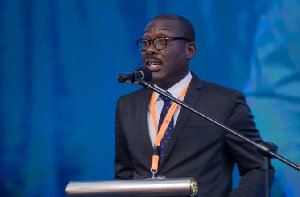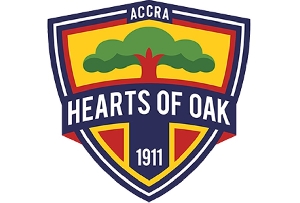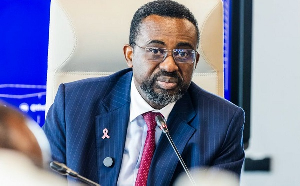Now the long quest was ending after centuries of marginalization in the development process by both the colonialists and Ghanaian goverments. At my annual check up recently at the Eye Clinic of the Ottawa General Hospital, I met a veteran Caucasian Canadian who has worked in Africa for over 30 years for the Canadian International Development Agency (CIDA). As we waited to be seen by our optometrists, we talked about Africa's development. "African governments have to bring their traditional rulers on board the development process," he told me with authority. I replied, "But most African do not respect their traditional rulers because of what the colonialists and Africans governments have done to them negatively." He responded, "But it can be changed with the right research and the right policiesin contemporary development climate." As our discussions progressed, I was surprised to hear a whiteman having such a dept of knowledge about Africa's values and her development process. That was in February this year.
In August this year, on the other side of the Atlantic Ocean from Canada, down in Ghana, President John Kufuor, in his second term and with his eyes on history, is saying the same thing as the Canadian development worker. Thus making the case to involve openly African traditional rulers in the Ghanaian/African development process having global appeal. The human mind appears to be linked by an invisible thread, as the German thinker, Karl Marx, would say. By hinting that the increasing spread of traditional chieftaincy quarrels necessitates the creation of a Ministry of Chieftaincy Affairs to tackle development problems, Kufour opens up the doors for looking at Ghanaian traditonal rulers in relation to Ghana's development process as the continental debate rages on in bringing African values, especially her traditional rulers, as key carriers of values, as key uploaders of development, to use an IT term, in the continent's development process. Kufour's chieftaincy ministry hint has also sparked global online discussions among some Ghanaian elites about the chieftaincy institution and the development process.
Such interests about Ghanaian chieftaincy and the current development challenges, after being for long neglected by Ghanaian elites and development experts, have come about because of the way the African nation-states was created by the colonialists, which saw African traditional rulers not only marginalised but also the colonialists' imposed their values, sometimes violently, on the African development process, demean African values, calling it "primitive" and other unhelpful and terrible names, and in the process, created a long-running complications and negative complexes that undermined Africa's self-confidence and self-esteem in her development process. No doubt, despite the long-running emotionally-charged Pan Africanism ideology, the African, as Ghana's Dr. Y.K. Amoako, former UN Economic Commission of Africa (ECA) executive secretary, observes, region has the most foreign dominated development paradigms or values imposed in her development process in the world.
Perhaps either lacking development process creativity or blinded by the British colonialist policies that did not put traditional rulers decisively on board the development process or inability to grasp the implications of one's environment or values in the development process, Ghana's first President Kwame Nkrumah and his Convention Peoples Party (CPP) government, as Richard Rathbone, a professor of Modern African History at University of London, U.K, indicated in "Nkrumah & the Chiefs: The Politics of Chieftaincy in Ghana, 1951-1960," the CPP waged a long campaign to wrest control of the Ghanaian countryside from the traditional rulers and the CPP's "frustrated attempts to democratize local government and the long and bitter campaigns mounted by many southern chiefs to resist their political marginalization." This had a fundamental changes not only on the history of Ghana but also the country's development process by making the traditional rulers not key participants in the country's development process. However, Dr. Daniel Tetteh Osabu-Kle, a political scientist at Canada's Carleton University, argues that the CPP regime was confronted with intense difficult climate that was influenced by some powerful traditional rulers to undermine the CPP regime. "The traditional rulers became a problem so Nkrumah has to clip their wings...Nkrumah wanted to encourage the traditional rulers but they didn't allow it."
In this sense, the creation of a chieftaincy ministry is seen by many to be a right idea since between 1951 till today, Ghanaian governments of all stripes, civilians as well as military, over-carried by British colonial policies of divide and rule, have sought to weaken, Rathbone says, the "chiefly principle in local government, then to weaken chieftaincy by attrition and eventually, by altering the legal basis of chieftaincy, to incorporate and control a considerably altered chieftaincy." However, Dr Akwasi B. Assenso, chair of African-American and African Diasporan Studies at Indiana University, USA thinks the creation of chieftaincy ministry will enhance Ghana's development process since "Chiefs, as traditional rulers, are integral components of the Ghanaian society. Therefore, it is both reassuring and crucial that a governmental department is to be created to delineate and, where possible, streamline chieftaincy affairs." In the same vein, though somehow ambivalent, Dr. Osabu-Kle argues that "it means something has gone wrong necessitating some cosmetic action at least. After independence, the Chieftaincy institutions were disgracefully reduced to nothing, but gaping sychophants singing their master's voice. Ghanaians refused to recognize that those we call chiefs today were Kings or Emperors who commanded political power and executed justice. They were masters and guardians of the treasures of knowledge, wisdom and culture accumulated over thousands of years."
However, many see in Kufour's proposed chieftaincy ministry idea a dangerous venture that will politicise the institution of traditional rulers and further erode its growth. Dr. George Ayittey, an economist and author of "Indigenous African Institutions," of the American University in Washington D.C, USA thinks the idea of a chieftaincy ministry is wrong and unconstitutional. "This is a bad idea and those of us who recognize and appreciate the critical importance of this venerable institution should oppose the creation of a Ministry of Chieftaincy Affairs for these reason. It will politicize that institution by drawing the chiefs into politics and subjecting them to central government control. The chiefs will lose their independence and those who do not "toe the government's line" may be "punished" by withholding development funds to their areas. Rawlings did this after the 1996 elections. Mugabe also does this." Dr. Osabu-Kle has his fears, too. "What is the guarantee that the proposed Ministry of Chiefs is going to empower the chiefs this time? I have my doubts. It could as well be another cosmetic and another bait to hook the chiefs into political servitude. Any genuine Ministry of Chieftaincy must seek to empower the chiefs to lead their people to economic prosperity and political maturity."
Ghanaian traditional rulers have not been openly empowered to lead their people to development since the creation of the Ghana nation-state, putting them in a dilemma as they come under pressure by their denizens to deliver the development eggs. Metaphysics: What would have happened to Ghanaian traditional rulers and their development process if the colonialists have not come to Ghana? What would have happened to the CPP regime and Ghanaian traditional rulers if there had not been colonial path to follow? Despite fears of politicization and bad historical feelings of yesteryears, some development-minded Ghanaian think the creation of a chieftaincy if informed by history and crafted to fit the development challanges of today, will bring traditional rulers on board the rigours of the development process, make them active in the development process, lessen their unprogressive destructive disputes and smooth out the Ghanaian development process.
Dr. Assenso offers that "during the era of the late President Kwame Nkrumah, his regime reportedly threatened that, if the local chiefs did not accommodate the policies and ideological bent of the day, many of them would "run away and leave their sandals behind. Hopefully, Ghanaian political leaders of today would avoid a similar confrontation but, instead, integrate these traditional rulers meaningfully into Ghanaian society through the creation of such a cabinet-level department. In the context of Ghana's development, enlightened chiefs and their sub-chiefs can serve in advisory capacities and, where possible, in active non-partisan roles." Dr. Osabu-Kle, aware of the controversy that will come from President Kufour's chieftaincy idea in the context of Ghana's unpalatable chieftaincy history, advises that the proposed chieftaincy ministry should be devoid of mainstrean partisan politics and that the staff of the ministry should be handled by people with deep knowledge of Ghanaian traditional institutions and development so that in case of misunderstandings cropping up they can handle it in Ghana's cultural and current development challenges context. President Kufour, a veteran politician, aware of this, has indicated that the government will not interfere in chieftaincy matters, and that "its concern was based on the fact that such disputes continued to retard development and progress, resulting in increased poverty among the people."
A reasonable number of today's Ghanaian traditional rulers are not only well educated but also globally exposed and highly development minded. The Asentehene, Osei Tutu 11's deep foray into the development process, which has spurred other traditional rulers into development action and made his Asanteman Council received milions of dollars from the World Bank, is not only a case in point but also a far departure from the colonial and CPP era. Says Dr. Assenso,"There are chiefs who are trained in essential professions, including teaching, law as well as in the sciences and the arts, such well-trained traditional rulers should be mobilised to serve various sectors of the national economy. In Liberia, the late President William V.S. Tubman utilized all chiefs as public relations officers, wherevy they promoted cultural awareness and development in their areas. Ghana may use some chiefs likewise, if they cannot serve in high-powered professional capacities."
By saying that ?government will not sit down unconcerned for chieftaincy disputes to continue to disturb the prevailing peace in the country,? President Kufour has not only thrown a challenge to his regime, and future ones, in the face of development challenges and the new on-going culture-development thinking, aware of the protracted history of chieftaincy institution and Ghana's development, but also signalled to Ghanaian traditional rulers that they are "most important human resource, indispensable in economic development, closer to the people, understands their needs and problems," as Dr. Ayittey says. In this sense, beyond the painful chieftaincy history, the increasingly growing respectability of African values globally, today's development challenges that call for holistics policies informed by one's values first and any other second, and the fact that an increasing number traditional rulers are better educated, it is imperative they be consulted on key development issues in Ghana's development process.
But why create a new chieftaicy ministry if the National House of Chiefs is there, for among other things, consultation on policy development and the involvement of traditional rulers in the development process? This view raises dilemma for the good intentions of President Kufour and his regime. Dr. Assenso attempts to resolve the dilemma: "While the National House of Chiefs is expected to eschew partisan politics, a Chieftaincy Ministry is to be deemed as an essential arm of the government of the day, with partisan interests. Apart from that distinction, it is expected that both groups can collabortae for the common weal and for the progress of the respective areas of where the chiefs serve. While there should be no efforts on the part of the Chieftaincy Ministry to co-opt or absorb chiefs as stooges and sychophants of the government of the day, it is still essential to see some meaningful collaboration between the new Ministry, when created, and the national House of Chiefs. Hopefully, the duties of a new Ministry, dedicated to the affairs of chieftaincy in Ghana, will be given true cabinet-level status but not as a mere secretariat like similar entities of the past. Above all, the new head of such a ministry should be very well versed in the intricacies of chieftaincy affairs and traditional roles of Ghanaian chiefs. If possible, he or she should not be appointed simply because of tribal and partisan allegiances."
In the climate of today's much more objective debate about culture and development globally, devoid of ethnocentricism, and its implications in nation building, and where even developed countries such as Canada are increasingly adding their indigenous, Aboriginal cultural values to almost all federal government policy makings in order to create holistic policies by consulting Aboriginal traditional rulers and institutions, the President Kufour-proposed chieftaincy ministry, among its functions, can be a sounding board for policy development where Ghanaian indigenous traditional cultural components are grafted with other aspects of policy development in order to ground all policies in the Ghanaian/African cultural environment first and any other second in order to float real sustainable policies and development.
Still, the chieftaincy ministry could partner with the Commission on National Culture (CNC), more or less a culture policy think tank, as Florence Gbolu and Dave Maass write in the Accra-based "The Ghanaian Chronicle," to "research outmoded cultural practices that are potentially damaging to the rights of individuals" and society's development process and "try to modify it," so as to open up the development process fully and realistically; for ?culture is dynamic and people should change as the society grows." Also the chieftaincy ministry, armed with vast knowledge of the implications of culture in the development process, working with CNC, could work to "protect culture and not make policies that violate the culture of the people but those that are reasonable, according to Torgui Awusu III, director for the CNC."
President Kufour's hint of a new chieftaincy ministry may emanate from his long, protracted journey in Ghanaian politics, history and the country's somehow confused development process, armed with vast experiences. For almost 50 years after independence, the Ghanaiain chieftaincy institution has swung in all kinds of the development process pendulum; from confusion to uncertainty to threats to emotionally wrenched dilemma in the development process. All these have seen the traditional rulers descend into unprogressive development abyss, appearing to be hypnotised into perpetual disputes among themselves, and in the process bringing down the development of the very people they are expected to uplift in the development process.
From President Kufour's convictions and the growing debate about bringing traditional rulers on board the development process openly, there is adventure in possibilities, and hope for Ghanaian cultural values dictating the country's development process in the framework of colonial legacies and the enabling aspects of the global culture. But the President Kufour-chieftaincy ministry view will lead into painful, nolstagic, unprecedented territory - with fears flashing here and there. It will require deep reflections, history, informed experiences and informed policy making and consultations to create the Ministry of Chieftaincy Affairs in today's Ghanaian hunger for development in the global context of the good life.















